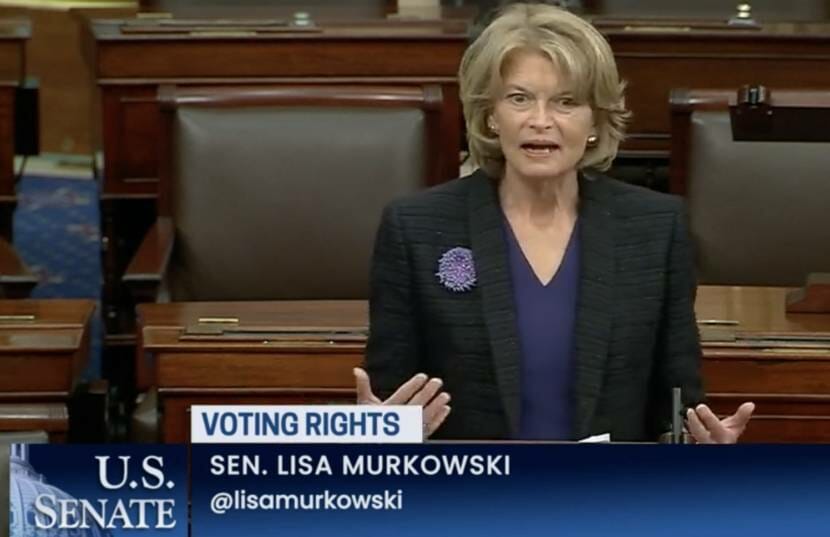
To restore a key piece of the 1965 Voting Rights Act, Democrats in the U.S. Senate needed 10 Republicans to vote with them to even bring the bill up for debate. They got just one one on Wednesday: Sen. Lisa Murkowski.
“I want us to continue to reduce those barriers to Americans ability to vote,” she said in a speech on the Senate floor Wednesday, before the procedural vote, “whether it is geographic, whether it’s logistical — we certainly know about that in Alaska — whether it’s partisan, or some other form.”
Free and fair elections are a cornerstone of democracy and American identity, Murkowski said.
The John Lewis Voting Rights Advancement Act would reinstate parts of the Civil Rights Era-law that the U.S. Supreme Court overturned in 2013. The centerpiece of the bill would restore the “preclearance” requirement. Until the Supreme Court struck it down, it required states with a history of discrimination to get the Justice Department to sign off before they change their voting rules.
As vice chair of the Senate Indian Affairs Committee, Murkowski said she feels especially obligated to address long-standing voting barriers that Native people face. The last renewal of the Voting Rights Act passed the Senate unanimously, she said.
“Wouldn’t that be a goal for us all?” she asked. “Wouldn’t that send the signal to people across this country from Alaska to Maine, to have faith, to have faith in our electoral process, in our elections?”
Murkowski said she doesn’t support the bill itself yet. She wanted the Senate to open debate on it while negotiations continue.
Senate Democrats say the bill is needed more than ever because Republican-led states are trying to make it harder to vote. Some states are trying to prune voter rolls and limit mail-in balloting, arguing that it will reduce the potential for voter fraud. That’s despite a lack of evidence showing widespread fraud in state or national elections.
(The conservative Heritage Foundation established a voter fraud database. It shows a few dozen cases in 2020, spread across multiple states.)
Sen. John Cornyn, R-Texas, argued against the John Lewis Act. He said it would give the Democratic Party control over state laws.
“In other words, the states would have to ask the federal government: Can we pass laws in in our state?” he said. “And it would be up to the Biden Justice Department and Merrick Garland to say yes or no.”
The vote to open debate on the bill failed 50-49. Senate Majority Leader Chuck Schumer voted no, a procedural tactic that allows him to bring the bill back up more easily. But it’s not clear there is even one other Republicans willing to advance the legislation, let alone nine.



